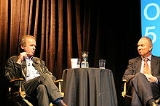
(1984) and London Fields
(1989). He is currently Professor of Creative Writing at the Centre for New Writing at the University of Manchester
, but will step down at the end of the 2010/11 academic year. The Times named him in 2008 as one of the 50 greatest British writers since 1945.
Amis's raw material is what he sees as the absurdity
of the postmodern
condition and the excesses of late-capitalist Western society with its grotesque caricatures.
Style is not neutral; it gives moral directions.![]()
Money doesn’t mind if we say it’s evil, it goes from strength to strength. It’s a fiction, an addiction, and a tacit conspiracy.![]()
Every writer hopes or boldly assumes that his life is in some sense exemplary, that the particular will turn out to be universal.![]()
One of the many things I do not understand about Americans is this: what is it like to be a citizen of a superpower, to maintain democratically the means of planetary extinction. I wonder how this contributes to the dreamlife of America, a dreamlife that is so deep and troubled.![]()

